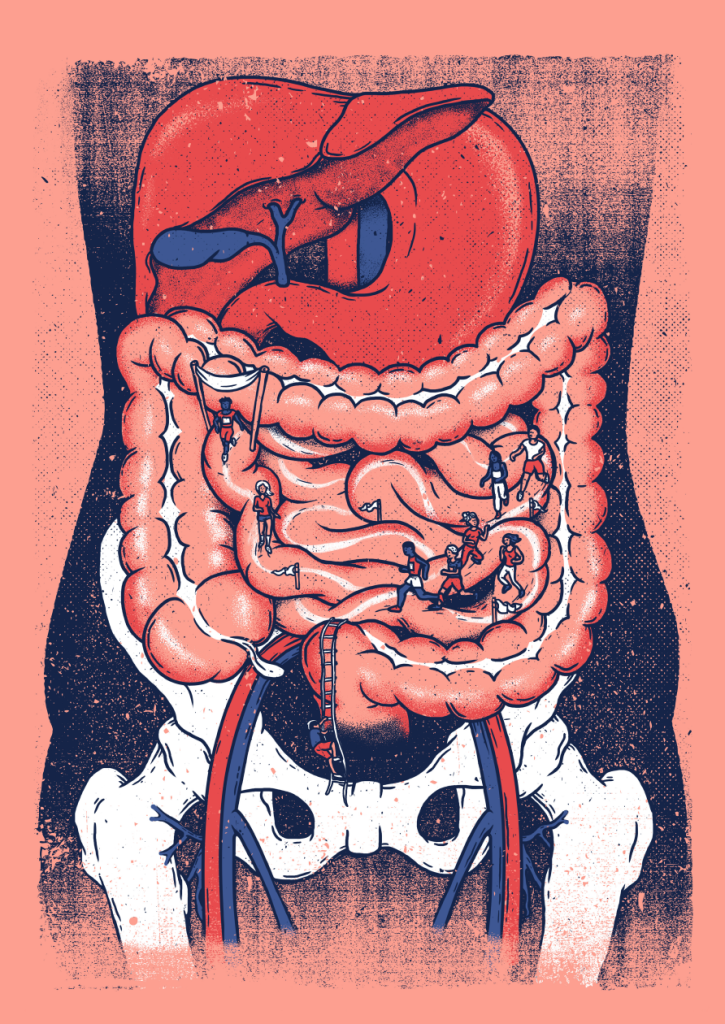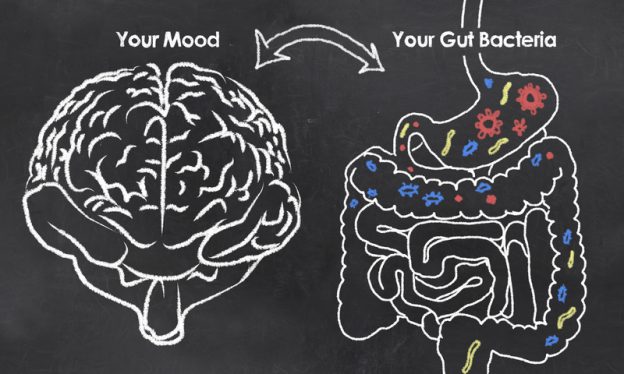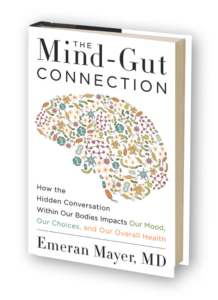Runners are a sensitive lot when it comes to our bodies, and especially when it comes to the inner rumblings of our stomach. We’re not talking ‘got the hangries?’ here. We’re talking: ‘how’s your motions’? With an increase in awareness and diagnosis of digestive issues such as Irritable Bowel Syndrome, food intolerances, Crohn’s and celiac disease, it’s no surprise that gut health is a hot topic of conversation. WORDS: Celeste Botton
With toxins ingested from improper diets at an all-time high, and sedentary lifestyles limiting physical activity, more people than ever before are suffering from stomach and digestive issues1.
Specialised books, fermented foods and hip kombucha brands have become wildly popular amongst other health trends in the past couple of years. But what is really happening to our guts, and why is it so important for runners to take care of them?
Central to our digestive system is microbiome, which is composed of the billions of microbes living in our large intestine. Each person has a microbiome unique to their body, like a fingerprint, that regulates a number of bodily functions such as hormone levels, metabolism, mood and immune system. Our gut function is affected by an array of factors, including diet, stress levels, and exposure to different pathogens such as viral and bacterial infections.
Naturopath Alice Wilson (alicenature.com) explains that gut health is a gateway to overall holistic health.
“What people don’t realise,” she says, “is that our immune system is mostly controlled by our gut. Hence, if we have deficiencies on a bacterial level, we’re exposing ourselves to a multitude of ailments.”

ILLUSTRATION: Annie Walter Design www.anniewalter.com
She explains that daily habits that we are often quick to neglect, notably sleep quality, food habits and stress levels, all directly take a toll on our gut resulting in issues that we tend to treat as symptomatic. Add physiologically and mentally taxing endurance sports to the mix, and you’re just asking for a bunch of the runs of the type you don’t want.
“Exercise is incredibly important, and it is a great stimulus for your secretory glands,” continues Alice. “In moderation, it ensures the healthy function of your gut by activating the enteric nervous system that moderates the stomach lining’s muscular structure and encourages the rapid elimination of toxins. But long and arduous athletic efforts weaken your digestive system; energy is pulled away from the gut to the brain, heart and lungs, leaving undigested food to ferment, which is why runners often suffer digestive troubles during tough runs.”
When training at a high volume, we are slowly chipping away at the healthy bacteria in our gut and without adequate upkeep, we are ultimately sabotaging our own performances.
“If athletes don’t maintain a healthy level of digestive enzymes, they will experience increased fatigue, slower recovery and a higher tendency to falling ill as well as bloating, constipation and vomiting during efforts,” explains Alice.

When the fragile gut barrier is disrupted, it can no longer process toxins and food antigens effectively, that in turn leak into our bodies, causing an array of problems. Furthermore, maintaining strong bones and joints as well as healthy tendons and ligaments is crucial for a high-impact sport like running.
A happy gut produces vitamins and enzymes that facilitate the absorption of minerals and metabolising calcium. By regulating our immune systems and enabling the production of short-chain fatty acids, our ‘good’ gut microbes contribute to reducing inflammation that can arise following a long or strenuous run. Long story short, keeping your gut healthy will speed up your recovery.
Alice further encourages athletes to incorporate glutamine and zinc as supplements in their diet. Since runners are using up more of our bodies’ resources during effort, they are also more susceptible to electrolyte imbalances and depleted glycogen storage which both impact recovery.
“Glutamine, and amino acids in general, contribute to cellular repair, whereas zinc acts to strengthen cellular and muscular structures. But remember that before trying to strengthen your gut, you have to actively understand what is going on, and what needs replacing first.”
Nutrient malabsorption is an issue that is highly common in female athletes, who will routinely be diagnosed as deficient in iron and calcium. Alice stresses that female athletes who have recently had children or plan to in the near future, should be extra mindful of their gut health due to their higher susceptibility to autoimmune diseases.
“Women are exposed to higher levels of oestrogen, which can lead to an overactive immune system and to issues such as hyperthyroidism or polycystic syndrome. In many cases, symptoms can be alleviated through the regulation of gut enzymes. Childbearing also alters women’s gut composition, so they need to be mindful of these changes to avoid putting unwanted stress on their digestive system and in turn increasing their exposure to diseases.”
For those striving for big athletic goals requiring intense training efforts, Alice strongly recommends following a digestive health programme in correlation with your training cycle.
“When you train, you follow a programme that determines your efforts and goals,” she says. “Once the cycle is done, you take the time to recover, reflect and repair. It should be the same with gut health. Re-assess the state of your digestive health and re-build a strong cellular structure to come back healthier.”
With the help of a naturopath or dietitian, athletes can get a full assessment of the cultures present in their gut. As such, they can glean a better understanding of what their digestive system needs to thrive and how to manage possible deficiencies.
Overall, Alice presses endurance athletes to consider gut health as equally as intrinsic to their performance as their muscular or cardio health.
“Sometimes all it takes are a few small adjustments to improve recovery, strength, energy expenditure during effort and overall health, both physical and mental,” she concludes.
- “Running as a Postmodern Probiotic to Optimize Gut Physiology and Health” (2015) by Akbar Nikkah
Gut Health basics
A few ground rules for keeping your gut – and therefore you – on top of your health…
- Adequate sleep in proportion to your exercise load
- Drinking enough fluids (upwards of 2L per day)
- Include natural probiotics in your diet (miso, tempeh, kimchee, sauerkraut, kefir, kombucha)
- Stay away from simple sugars and too much starch: these will reduce the diversity of bacteria in your gut and weaken it
- Avoid eating large quantities of food just before or during runs as this puts stress on the digestive system
- Ensure you’re familiar with what foods work well with your gut on the run and stick to them
- Prebiotic rich foods: vegetables, fruits, whole grains, inulin rich foods (chicory, garlic, onions, asparagus), best consumed post-run
- Consult a naturopath or registered dietitian to get a full work-up on the state of your gut bacteria and detect any potential food sensitivities
- Be aware that taking antibiotics strips your intestinal flora from healthy bacteria and avoid overly strenuous efforts throughout the duration of the course.
 Good Gut Reads
Good Gut Reads
- The Mind–Gut Connection by Emneran Mayer (Harper Collins, 2016)
- Brain Maker: The Power of Gut Microbes to Heal and Protect Your Brain by David H. Perlmutter and Kristin Loberg (Hodder & Stoughton, 2015)
- PODCAST: Dr. Grace Liu: How to Build a Warrior Gut, Common and Solvable Gut Issues in Athletes (www.enduranceplanet.com/dr-grace-liu-how-to-build-a-warrior-gut-common-and-solvable-gut-issues-in-athletes-and-more/)
- RESEARCH: Gastrointestinal Complaints During Exercise: Prevalence, Etiology, and Nutritional Recommendations by Erik Pardo de Oliveira et al (Sports Medicine, Auckland NZ, 2014)










